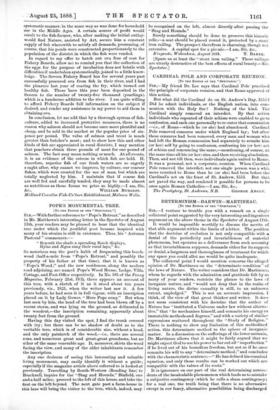CARDINAL POLE AND CORPORATE REUNION.
[To THE EDITOR OF THE "SPECTATOR."]
Siu,—My friend Dr. Lee says that Cardinal Pole practised the principle of corporate reunion, and that Rome approved of this action.
But what did the Cardinal do on St. Andrew's Day, 1553? Did he admit individuals, or the English nation, into com- munion with the Holy See ? Nothing of the kind. The Cardinal simply removed an interdict. By that action individuals who repented of their schism were enabled to go to confession, and each one personally to re-enter that communion —i.e., of Rome—which he (or she) had abandoned. Cardinal Pole removed censures under which England lay; but after these censures had been removed, every man and woman"who had left the Roman communion had separately to reunite him (or her) self by going to confession, confessing his (or her) act of schism and renouncing the same,—mentioning, of course, at the same time all his (or her) sins, and then receiving absolution. Then, and not till then, were individuals again united to Rome. It was a personal, not a corporate, reunion. When Cardinal Pole removed the interdict, not one single person was a whit more reunited to Rome than he (or she) had been before the Cardinal's act on the feast of St. Andrew, 1553. But that act paved the way, and rendered it possible for persons to be once again Roman Catholics.—I am, Sir, &c., The Presbytery, St. Andrews, N.B. GEORGE ANGUS.


































 Previous page
Previous page